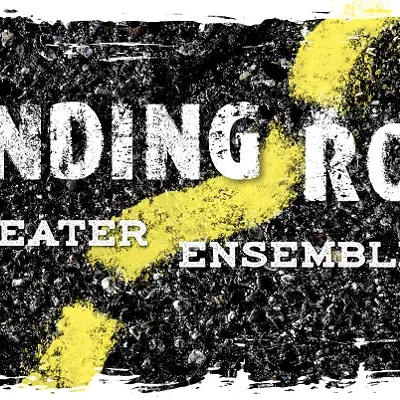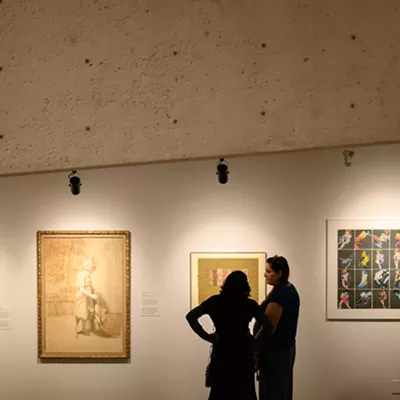Two vastly different plays
opened here last weekend. Winding Road Theater Ensemble has taken on Arthur Miller's 1949 Pulitzer Prize-winning play, "Death of a Salesman," and the Rogue Theater brings us a wild romp by Jez Butterworth, "Jerusalem." The plays offer huge contrasts in many ways, but they are both chock-full of ideas and fireworks which make us sit up and pay attention.
"Death of a Salesman" is often thought of as an indictment of the American Dream, and in a way, it is that. But it is so much more.
Willy Loman (David Alexander Johnston) is a traveling salesman who, at 63, has lost his way. He has financed a family with his selling skills, but now, he has lost his whatever skills he might have had, and more importantly, he is losing his mind. His wife, Linda (Peg Peterson), realizes he is in trouble, that he is more than toying with the idea of suicide. His two grown sons are a disappointment, particularly one-time golden boy Biff (Steve Wood,) who had one time stumbled upon at least one of the ways his father is "a big blow." (Biff calls his brother Happy (Josh Parra)"a big blow" in a climactic scene, but it is equally true of Willy.) Biff's disillusion feeds his fall into being a philandering failure, which Willy thinks is grounded in spite, that Biff is getting back at him by not becoming the successful businessman Willy knew he was destined to be.
But after a lifetime of exposure to the false overconfidence Willy has tried to sell him, Biff has come to know who he is: someone who wants to be outside, working with his hands, not a straight-jacketed businessman. When he suggests that he doesn't need to be a puffed-up golden boy, that he just needs to be himself, even if it's just "a dime a dozen" ordinary man, just like Willy, Willy goes ballistic. "I am not a dime a dozen. I am Willy Loman." Biff counters, "You were never anything but a hard-working drummer who landed in the ash can like all the rest of them!"
At its heart the play addresses what happens when one is sold a bill of goods and doesn't know and respect his own nature and limitations. And for Willy, that means he thinks he is worth more dead than he is alive.
Winding Road gives us a respectable reading of Miller's great play. The cast is solid enough to get the story told, and if you've never seen a production of this piece, you should seize the opportunity to see this one. Sure, there are some stumbles and a few directorial choices which are puzzling. (Director Glen Coffman has the show played out in the round, which just doesn't work, even if his intent is to imply that the action is taking place in a boxing ring, which is the only thing I could think of to justify the choice.)
It's critical that the actor portraying Willy be convincing, and Johnston gives an admirable performance of the lost man. The play takes place in Willy's mind, and his memories from the past occur within the action of the present, which poses huge obstacles for an actor. Although Johnston gives us a clear picture of his confusion, his Willy is a very disagreeable man—and rightly so—but it's hard to have sympathy for him. We don't really feel the deep sadness which Miller designed as the foundation of this character. There are many layers of this character, however, and Johnston finds many of them. His is a good portrayal of a very complex character.
"Jerusalem" is a fearless "fracas" of a play, to borrow a term from the script, and it's given a fairly fearless production by the gang at Rogue.
It opens with a solitary fairy, a young women with glittered wings, who stays onstage for just a moment. Upon her exit a bizarre scene is played out in the dark, with flashes of light, which could be a bacchanalian romp or a war battle (and, indeed, may be a bit of both.) In the next scene, we see the location of this romp/battle: the outside of a run-down travel trailer which belongs to Johnny "Rooster" Byron (Joseph McGrath), a seasoned guy wearing a headband, tank top, camouflage-print pants and combat boots, who, we come to learn, has some mighty powerful attributes and answers to no one but himself. Gradually there begins to appear a group of young people who apparently were a part of the alcohol-and-drug-fueled revels of the night before. The play is a little awkward here (although quite funny) as a context is built.
We begin to put the pieces together when we realize that Rooster and his stronghold at the edge of the wood is upsetting the residents of the new developments ever encroaching upon the land and he is to be evicted from his wilderness paradise. Ah, Rooster is a present day Green Man, or Pan, perhaps, the god of the wild, of nature. And, we learn, it is St. George's Day, April 23, when England celebrates the end of winter and the re-birth of spring. Within such a context, things start making a bit more sense, and we grab on to this story which twists and turns and ultimately proves to be a pretty powerful piece of theater.
"Jerusalem" refers to a line of poetry by William Blake—like he wasn't a wild man or anything—which was set to music, a song which summons the possibility that rural England is the "new Jerusalem," a Biblical reference to the second coming, or heaven. Through Butterworth's eyes, maybe not so much.
There is so much wildness in this piece—as there must be – that both Butterworth and director Cynthia Meier have had to find some sort of balance between it being so wild, so full of nature and its inevitable chaos, as to be confusing, and lassoing it into being something we can make sense of in a poetically theatrical kind of way. This is not an easy task, and sometimes that balance is missing. But, full of good performances, woven throughout with original music, and played out on a great set, "Jerusalem" is a unique interpretation of a unique theatrical voice.
Interestingly, both of these plays address the conflict between our nature, and our inescapable relation to it, and our industry, which makes us both rich and poor. It seems that this conflict will forever cause us pain. But perhaps it too will continue to be the inspiration for some great theater.
Jerusalem
presented by the Rogue Theatre
7:30 p.m. Thursday through Saturday, and 2 p.m. Sunday through November 23; additional 2 p.m. matinee Saturday, Nov. 22
The Rogue Theatre at The Historic Y
300 East University Boulevard
$32
Running time: 3 hours 15 minutes with two intermissions
551-2053; www.theroguetheatre.org
Death of a Salesman
presented by Winding Road Theater Ensemble
7:30 Friday and Saturday and 2 p.m. Sunday through Nov. 23; (no show Saturday, Nov. 22)
Temple of Music and Art Cabaret Space330 S. Scott Avenue in Tucson
$19-$22
Running time: 2 hours 30 minutes with intermission
401-3626; www.windingroadtheater.org








